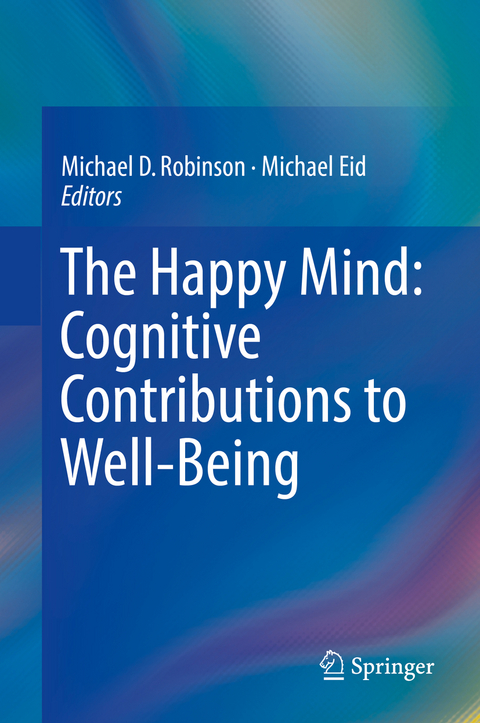
The Happy Mind: Cognitive Contributions to Well-Being
Springer International Publishing (Verlag)
978-3-319-58761-5 (ISBN)
Michael D. Robinson is a Professor of Psychology at North Dakota State University. He received his Ph.D. in social psychology from the University of California, Davis, in 1996. He is a prolific researcher in the areas of personality, assessment, self-regulation, cognition, and emotion whose work has been funded by NSF and NIH. He has been or is an Associate Editor for a number of journals, including Cognition and Emotion, Emotion, and Journal of Personality and Social Psychology. In addition, he has edited two published books: Handbook of Cognition and Emotion (Robinson, Watkins, & Harmon-Jones, 2013; Guilford Press) and The Power of Metaphor (Landau, Robinson, & Meier, 2014; American Psychological Association). He is considered an expert in implicit approaches to personality and in cognitive approaches to emotion and self-regulation. Michael Eid is professor of psychology at the Free University of Berlin, Germany. He received his doctorate from the University of Trier (Germany) in 1994, and has been professor and visiting professor at several German universities and the University of Geneva (Switzerland). His main research interests concern the analysis of multimethod data, longitudinal data analysis, structural equation modeling, and item response theory. His more applied research focuses on subjective well-being and health psychology. He has been editor and associate editor of several journals including Methodology and the Journal of Positive Psychology.
Chapter 1. Introduction; Michael D. Robinson and Michael Eid.- Part I. The Mind.- Chapter 2. Attention, Emotion, and Well-Being: An Adult Lifespan Perspective; Kimberley M. Livingstone and Derek Isaacowitz.- Chapter 3. Autobiographical Memory; Dieter Ferring.- Chapter 4. Mindfulness and Well-being; Hooria Jazaieri and Shauna Shapiro.- Chapter 5. The Quiet Ego: Concept, Measurement, and Well-Being; Heidi A. Waymen and Jack J. Bauer.- Chapter 6. Staying Happier; Megan M. Fritz, Lisa C. Walsh and Sonja Lyubomirsky.- Part II. Positive Cognitions.- Chapter 7. Beyond Hedonic and Eudaimonic Well-Being: Inspiration and the Self-Transcendence Tradition; Will C.M. Belzak, Yoon Young Sim and Lena M. Wadsworth.- Chapter 8. Savoring and Well-Being: Mapping the Cognitive-Emotional Terrain of the Happy Mind; Jennifer L. Smith and Fred B. Bryant.- Chapter 9. Cognitive Aspects of Positive Emotions: A Broader View for Well-Being; Laura G. Kiken and Barbara L. Fredrickson.- Chapter 10. Positive Illusions and the Happy Mind; Astrid Schütz and Roy F. Baumeister.- Chapter 11. Optimism; Suzanne C. Segerstrom, Charles S. Carver and Michael F. Scheier.- Part III. Self-Regulation.- Chapter 12. Perspectives on Studying Perceived Control in the 21st Century; Judith G. Chipperfield, Jeremy M. Hamm, Raymond P. Perry and Joelle C. Ruthig.- Chapter 13. Means, Ends, and Happiness: The Role of Goals for Subjective Well-Being; Marie Hennecke and Veronika Brandstätter.- Chapter 14. Coping, Emotion Regulation, and Well-Being: Intrapersonal and Interpersonal Processes; Brett Marroquín, Howard Tennen and Annette L. Stanton.- Chapter 15. Autobiographical Memory, Self-Regulation, and Well-Being; Dieter Ferring and Isabelle Tournier.- Chapter 16. Self-Affirmation: Protecting the Self and Protecting Subjective Well-Being; Natalie Schüz and Benjamin Schüz.- Part IV. Social Processes.- Chapter 17. Social Comparisons and Well-Being; Abraham P. Buunk and Pieternel Dijkstra.- Chapter 18. Prosocial Behavior and Empathy-Related Responding: Relations to Children's Well-Being; Tracy L. Spinrad and Nancy Eisenberg.- Chapter 19. On the Road to Social Well-Being; Giulia Weyrich, Alex Zautra and Eva Zautra.- Part V. Meaning.- Chapter 20. The Functionality of Emotional Clarity: A Process-Oriented Approach to Understanding the Relation Between Emotional Clarity and Well-Being; Tanja Lischetzke and Michael Eid.- Chapter 21. Can Affectively Negative Experiences Contribute to Well-Being? The Affectively Negative Need-Fulfillment Model; Jacob Juhl, Clay Routledge and Joshua A. Hicks.- Chapter 22. Making Sense: Meaning in Life in a Cognitive Context; Sarah Ward and Laura King.- Chapter 23. Nostalgia as a Psychological Resource for a Meaningful Life; Andrew A. Abeyta and Clay Routledge.- Chapter 24. Religious Cognitions and Well-Being: A Meaning Perspective; Crystal L. Park.- Chapter 25. Wiser But Not Sadder, Blissful But Not Ignorant: Exploring the Co-Development of Wisdom and Well-Being Over Time; Nic. M. Weststrate and Judith Glück.
| Erscheinungsdatum | 28.07.2017 |
|---|---|
| Zusatzinfo | VII, 480 p. 23 illus. |
| Verlagsort | Cham |
| Sprache | englisch |
| Maße | 155 x 235 mm |
| Gewicht | 889 g |
| Themenwelt | Geisteswissenschaften ► Psychologie ► Allgemeine Psychologie |
| Geisteswissenschaften ► Psychologie ► Humanistische Psychotherapien | |
| Geisteswissenschaften ► Psychologie ► Verhaltenstherapie | |
| Studium ► Querschnittsbereiche ► Prävention / Gesundheitsförderung | |
| Sozialwissenschaften ► Soziologie | |
| Schlagworte | 0 (Null) • 1 (Jahr) • 1-Liter-Auto • Behavioral Science and Psychology • Cognition & cognitive psychology • Cognition & cognitive psychology • Cognitive Psychology • Emotional Clarity • Executive Function of the Mind • Gratitude and Positive Psychology • Memory and Well-Being • Mindfulness and Paying Attention • Positive Cognitions Enhancing Well-Being • Positive Emotions • positive psychology • Psychology • Quality of Life Research • Quieting the Ego to Handle the Self • Selectivity of the Mind • Self-Enhancement and Self-Confidence • social & ethical issues • Social Cognition and Mental Processes • Social comparison • Social & ethical issues • Spirituality and Benefiting Well-Being • The Hedonic Treadmill of the Mind's Tendency • Understanding Meaning and Well-Being • Wisdom and its Relation to Well-Being |
| ISBN-10 | 3-319-58761-7 / 3319587617 |
| ISBN-13 | 978-3-319-58761-5 / 9783319587615 |
| Zustand | Neuware |
| Haben Sie eine Frage zum Produkt? |
aus dem Bereich


